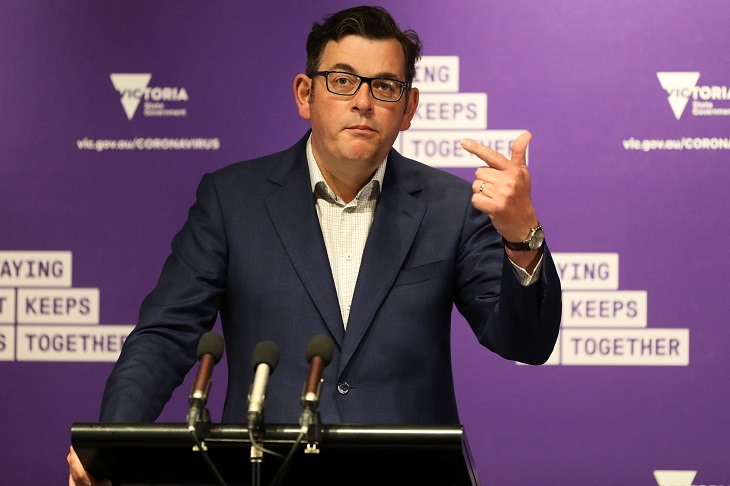The government’s handling of the Covid pandemic in Victoria has been deplorable. But while the temptation is to blame Daniel Andrews or Scott Morrison personally (depending on which team you barrack for), this manifest failure is also the result of various cancers in our political culture.
The Covid pandemic was always going to create suffering no matter how well the government handled it. To be fair to our political leaders, it demanded they make incredibly important and difficult decisions, on limited information, in quick time. And there were no good options, only less bad ones.
Nonetheless, the appalling government response – the hotel quarantine catastrophe, glacial vaccine rollout, decimation of children’s mental health, widespread human rights abuses, and police brutality – created a tidal wave of avoidable pain for millions of Victorians.
The numbers don’t lie. Melbourne had the longest lockdown in the world and Victoria had the highest death rate in Australia. Every Victorian suffered because of government failure.
While the worldview and character of Daniel Andrews contributed greatly to this despair, even in an anaemic democracy like Victoria the leader is still beholden to the political and broader culture. For a political leader, the options going forward in any given situation are nested within what’s accepted and expected by his or her colleagues, the media, and the public.
The first cultural issue that exacerbated the crisis is our tendency to value gesture over action. In a society that frequently punishes having the wrong opinion more severely than actually doing the wrong thing, it’s little wonder that political leaders resort to empty symbolism instead of actually governing. Governing is difficult, unglamorous, often thankless if you get it right and hell to pay if you don’t. Gesture is costless and easy – an alluring combination.
Gesture comes easily to the Andrews government. Governance … not so much. Mid-pandemic, public servants were ordered to not use the words ‘husband’ and ‘wife’ in the workplace. Yet during the state’s darkest hour in 2020, contact tracers were famously using fax machines.
At the federal level, the Morrison government astonishingly saw fit to concede a culture war before it had even begun in January 2021 by replacing ‘young and free’ with ‘one and free’ in the national anthem. (I would’ve thought the word ‘free’ was the one that needed changing after the last two years.) This came before the government’s unforgivably slow vaccine rollout punctuated by the Prime Minister’s famous incantation ‘it’s not a race’. It was for Victorians. And we lost.
The second pathology of our political culture that cost Victorians during the pandemic is the obsession of our politicians with the electoral cycle. Politicians have always been preoccupied with their political survival and responding to the public mood is, of course, how democracy is meant to work. But it feels like re-election has become the point of a political career, rather than a means to an end.
More than ever politicians seem to pander to sectoral interests to get to 51 per cent rather than govern for the good of the whole community, even those people who didn’t vote for them. On this front, Daniel Andrews wrote the book.
One example is Black Lives Matter supporters rightly being allowed to protest during the pandemic. Compare this to the brutal treatment of anti-lockdown protesters, including an elderly woman knocked to the ground by police and then pepper-sprayed while still lying there.
But more than that, according to documents obtained through FOI by The Australian, the Victorian government engaged a communications company during the pandemic that advises clients to ‘antagonise’ political opponents because ‘antagonised opponents are angrier, less coherent and less persuasive’.
Just think about that for a second. Maybe you lost your business, or your kids were struggling or you lost a loved one because of the disastrous hotel quarantine program. If you didn’t support government policy, it appears the government’s strategy was to make you ‘antagonised’ and ‘angrier’. In other words, to brutalise you further because it’s good to win elections.
The next reality Victorians (and others) have to acknowledge is that government spending doesn’t magically solve problems. Take a quick glance at the premier’s website if you can stomach it. It comprises announcement after announcement of millions of dollars for this program and that initiative. As if assigning a random dollar figure to the top of a media release will make up for all the pain this government has inflicted on people.
The most pathetic example of this was the motion in the Victorian upper house in November calling for the creation of a Minister for Loneliness. It’s hard to imagine a more bitterly ironic development. The latest report from the Victorian Agency for Health Information reveals that the number of children and teenagers being hospitalised with a mental health emergency is up 37 per cent on 2019 levels.
Those children are a problem hugely exacerbated by the failures of the Victorian government. They will try to solve it by throwing other people’s money at it. Because that’s how they try to solve every problem. But family, school, community, work, faith, and friendship will do infinitely more for those kids than whichever subservient hack from Daniel Andrews’ faction gets appointed Minister for Loneliness. If we as a community don’t wake up to this reality, then we are the mugs.
Unless we can reverse these trends in our political culture, the fear with the next crisis that comes along – and it is coming – will not be that it wreaks the same havoc. The fear will be that it will be much worse.
Peter Gregory is a researcher from Melbourne.
Got something to add? Join the discussion and comment below.
Get 10 issues for just $10
Subscribe to The Spectator Australia today for the next 10 magazine issues, plus full online access, for just $10.

























Comments
Don't miss out
Join the conversation with other Spectator Australia readers. Subscribe to leave a comment.
SUBSCRIBEAlready a subscriber? Log in